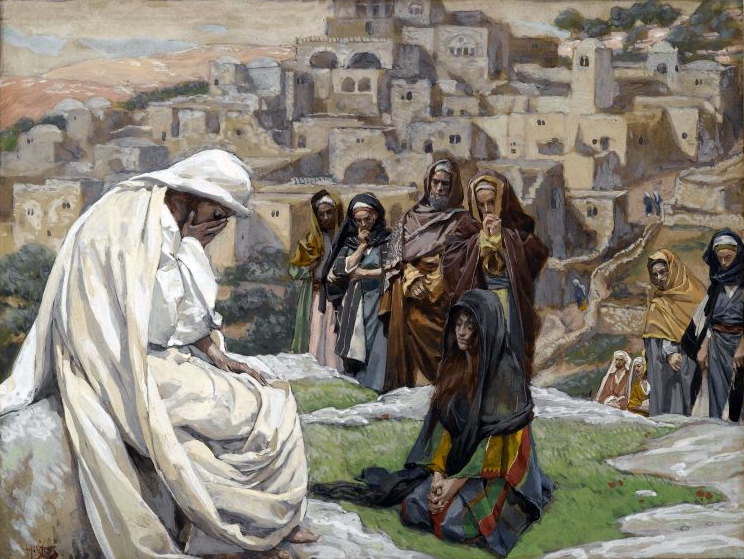Editor’s note: The following is extracted from The Village Tragedy and Other Sermons, by Rev. Clovis G. Chappell, D.D. (published 1921).
John 11:14
“Then said Jesus unto them plainly, Lazarus is dead.” For most of us that is the last word. There is nothing else to be said. The worst possible has already happened. The grimmest of all grim tragedies has already been enacted. Lazarus is dead — the nurse may now go home. The physician, faithful to the last, may return to his office. Medicines, poultices, ministering hands are no longer needed. Disease has done its grim work — Lazarus is dead.
What an old tragedy this is, how commonplace. When the hearse passed you on the street yesterday you hardly turned your head. It is soon forgotten. It is so usual. It is so ordinary. And yet how new is this tragedy. How it comes to you with a freshness of pain and heartache and despair as if you were the first and only one that had ever looked into the glazed eyes of somebody you loved.
Remember it was just that new to Martha and Mary. There had not been a happier home in the little village of Bethany than theirs. They had that which above all else makes for happiness — they had love one for the other. Lazarus and Martha and Mary loved each other. Then they had love for Jesus. And that forms a sure basis for a happy home. There is no other foundation like it.
But Lazarus is dead. He who was the head of the house, he who was their protector — Lazarus, the loved brother, is gone out beyond the hearing of their voices and beyond the reach of their hands. And their home from being the happiest of the village, is now the saddest and the gloomiest and the darkest and the most hopeless. The light has gone out. The sun has set. Home can never be again what it was in the good old days.
How they had loved and rejoiced in this little village home. How they had made others love and rejoice in it. How open-handed they were in their hospitality. Their home was the preacher’s home. I think there was scarcely a home in the world where Jesus found so warm a welcome. I think there was no other place where He found more responsive and understanding hearts. But all has changed now. Nothing can ever be the same again — Lazarus is dead.
Just how this fatal sickness slipped upon Lazarus we do not know. We are not told how intense was his suffering. We are not told how long he lingered. But be assured of this, that from the day he was taken sick he was nursed with the tenderest care and solicitude. And many a time did the sisters say to each other, “If Jesus would only come.” And there was a great dread lest death should put his ghastly foot across the door sill before their favored Guest should come again.
At last they were unable to endure the suspense and anxiety longer. They sent a messenger to Jesus. And while this messenger carried only the statement of a fact, yet that statement had in it unuttered prayers sweet with faith and wet with tears. “He whom thou lovest is sick.” That was the message. That was all they said. That was all they felt there was any need to say. They did not tell Jesus what to do. They did not bid Him hurry to the bedside of His friend. They told Him the simple, sorrowful fact, “He whom thou lovest is sick.”
Then followed those testing days of waiting. How many times they went to look out the window no one will ever know. How many times one of them stole through the door and down beyond the bend of the road we can only guess. But be assured of this fact, they watched and waited and hoped. But death came before He came. Then they hoped He would be there for the funeral. But they went to the grave alone and came home alone. And even yet Jesus is not come.
Now why was this tragedy allowed to take place? Why must Lazarus suffer? Why must death lay hold of him? Why must his sisters be called upon to pass through this Gethsemane? I am sure that these questions perplexed these two sisters long ago, just as they sometimes perplex ourselves and wring our own hearts.
This tragedy did not take place because of the ignorance of Jesus. They were sure of that. Fearing that He might not know, they sent a message to tell Him. They had to realize that Jesus knew all about it. He knew the pain of Lazarus. He knew their own anguish and bitter aching of heart. And I like to think just as He knew all about Lazarus and Martha and Mary as they went through their great trial, so He knows all about you and me. Jesus knows.
So it was not ignorance on the part of Christ that allowed this tragedy to take place. Neither was it His powerlessness. Martha and Mary were convinced of that. They felt that He could have prevented it if He had only been there. They were somehow confident that if He had stood in the door, even mighty death could never have slipped in past Him. They were sure that His presence would have been enough. They were confident that His might was sufficient even for the defeating of the grim purpose of death.
Neither is the death of Lazarus a mark of the lack of love on the part of Jesus. That fact is made blessedly plain to us. “He whom thou lovest is sick,” said the message. And many folks are sick whom Jesus loves. Do not understand me to deny for a moment the power of Jesus to heal the sick. He has that power. But mark me, He does not exercise it in every case. Many a loved saint of God is sick and will continue sick till they reach that blessed Country where the winsome Physician “waits with eternal healing in His fingers.”
The fact that Lazarus sickened and suffered and died was then not a mark of the lack of love on the part of Jesus. It was rather a mark of the opposite. Will you notice this strange sentence: “Now Jesus loved Martha and her sister and Lazarus. When He had heard therefore that he was sick, He abode two days still in the same place where He was.”
First we read that He loved these three. He did not love them as a family simply. He loved them as individuals. Christ’s love, like our own, is a personal and individual something. He does not love men in the mass. He does not save men in the mass. He loves and seeks and saves the individual.
My father and mother had quite a large family of children. But they did not love us as a group simply. They called us each by name and loved us each individually. I love to think of their love for all their children. I like to think also of their love for me. I love to think of Christ’s love for a world, but I like to say with Paul, “He loved me and gave Himself for me.”
Jesus then loved these three individually, personally. Therefore He stayed away from them in the hour of their dire need. He loved them; therefore He delayed till Lazarus died and till there was the setting of a great hope in the lives of the two sisters that was like the setting of the sun. What a strange “therefore” this is! He loved them; therefore He hastened to go to their assistance — that is what we would have expected. He loved them; therefore as soon as He found they were in trouble He made haste to help. But instead we read, “He loved them; therefore He stayed away. He loved them ; therefore He allowed disease to have its way with Lazarus and death to enter in unafraid.”
This is a lesson we need to learn again and again, that Love sometimes sees best to let us suffer. So often we feel that ease and exemption from pain, success and prosperity — that these only are marks of God’s love and of God’s favor. It is an old idea that has haunted the thought of the church through the centuries. The old time Sunday School story used to have a good boy and a bad boy. And the bad boy was always getting the worst of it and the good boy was always getting the pie. But it is wrong and altogether wrong. Many wicked men prosper. Many good men go to the wall and fail. But this does not mean that God loves the one and does not love the other.
God loved Martha and her sister and Lazarus; there fore he will let Lazarus die. God loves you, therefore He brought to you that great disappointment. God loves you, therefore He put the hand of affliction upon you. God loves you, therefore you were called to kneel by the coffin of your dearest and best. God loved Paul, therefore He allowed him to be afflicted with a thorn in the flesh. And it was on that grim and for bidding thorn that Paul found in after years growing the rarest and sweetest flowers.
Why then was this tragedy allowed to take place? It was because Christ loved these people. It was because He loves us. And loving them and loving us, He wanted to give us a new and deeper and more wonderful knowledge of Himself. “I am glad,” He said to His disciples, “that for your sakes I was not there to the intent that you might believe.” He was glad because He knew that it is only through pain that life’s greatest lessons are learned. He knew that the choicest souls all through the centuries are the souls that have suffered.
Do you remember Gwen in “The Sky Pilot,” that charming little story by Ralph Connor? She was a wild, wilful thing, loving above all else the great out-of- doors, the plain and the deep, cool canyons. A wonderful rider she was, and her pony brought this loved world within her daily enjoyment. But it came to pass that her pony fell with her. She was caught under him and so badly crippled that she could never ride again. And now up in the little cabin at the head of the canyon she was lying day after day, bitter, raving, rebellious, fretting her life away.
One day the Sky Pilot came to see her. And he was brave enough to tell her the story of the canyons. He told her how that the Master of the Prairie one day walked out over the plains, and though He found many lovely flowers, He missed the ones that He loved best. He then sent the birds and the winds to plant these flowers. But they had no sooner sprung up than they withered away. At last in seeming anger the Master sent a thunderbolt and cleft the prairie to the heart. For a long time it groaned with the pain of its black wound. Then the birds and the winds again scattered the seeds of the flowers that the Master loved best. And the fairest flowers to be found in all the land were those that grew in the canyon, the once ugly wound. And a cool sweet place it was with all its shades and songs and silences.
And now Gwen’s eyes were opened and her heart as well. She was no longer rebellious. She became strangely sweet and strangely patient and tender, for into her wounded life the King had come. And He planted in her soul garden the flowers that He loves the best. There were love, joy, peace, long suffering, gentleness and goodness. And while these flowers bloom in every heart in which the King is gardener, yet it does seem that they grow in their richest profusion in the garden of those hearts that have been wounded and broken.
What did Jesus teach these tearful women years ago? And what does He teach us through their great sorrow? First, He teaches us that the fact that we suffer, that the fact that our hearts ache and break sometimes — does not necessarily mean that He Himself is absent. Martha and Mary felt that if Jesus had only been there this could never have happened. But in reality He was there. Nothing had taken place without His knowledge. Nothing had taken place without His will. All the while that death was doing its grim work Jesus was there “closer than breathing and nearer than hands and feet.”
I know that there is suffering that comes because of the absence of Jesus. “Lord, if thou hadst been here my brother had not died morally” — many a man can say that who has been unfaithful to his brother. “Lord, if thou hadst been here my son had not died morally” — many a father can say that over whose ragged and unfaithful life his boy has stumbled out into a life of death in trespasses and in sin. If Christ had been in your home your children would not be the heartache that they are today. If Christ had been in your home it would not be the wreck it is today. How many men and women there are who are separated and whose children are robbed of the privileges of a complete home because of sin. Jesus was not there — that is the reason you let lust put its grim handcuffs upon you. Jesus was not there — that is the reason you made a hell out of your humble little home. Yes, many a broken heart may say, “If thou hadst been here this tragedy would never have taken place.” But this was not the case with Martha and Mary. They learned, and we learn, that Jesus may be very near to us even though we suffer, even though our hearts ache and bleed and break.
They learned, in the second place, the wonderful lesson of the sympathy of Jesus. This chapter holds in its’ hands one of the sweetest sentences ever penned, “Jesus wept.” How human He was, how tender, how sympathetic. The thorn crown, the agonies of the cross could not make Him weep, but He wept at the sorrows of those who loved Him.
What a blessed something is sympathy. There is enough in a look, in a handshake, in a smile sometimes to keep our hopes from dying and our hearts from breaking. How much all of us owe to the sympathy that has been given us along the way. But the most real thing in the world is the sympathy of Jesus. In all our afflictions He is afflicted. And there is never a darkened home but that Jesus is there. And there is never a broken heart and never an open grave but that Christ is there. In patience He waits to be recognized. He longs to extend His sympathy. He yearns to “kiss our tears into jewels” and change our night into marvelous day.
Then, last of all, there came to these, as there comes to ourselves today, a new and satisfying assurance of the reality of the after life. Christ lets us know here, first of all, that the after life is a present fact. You remember how He said to Martha, “Thy brother shall rise again.” But she had heard that trite encouragement again and again from the Jews till she had grown tired. And there is disappointment that amounts almost to impatience in her answer, “I know he shall rise again at the resurrection at the last day.” But what she means to say is, “But Master, that is so far off. That is so mysterious, so uncertain, so dim and distant in the haze of the eternities.”
Will you note the answer that Christ makes: “I am the resurrection and the life. I am not distant. I am not future. I am here. I am an eternal, present fact.” So life, eternal life, is an abidingly present reality. “To be absent from the body,” as Paul tells us, “is to be present with the Lord.” The dead live now, not “shall live by and by.” Our God is the God of Abraham, Isaac and Jacob. Therefore Abraham and Isaac and Jacob still live. For God, Christ tells us, is not the God of the dead, but of the living.
Then Christ not only teaches us that the after life is a present fact, but He teaches us also the survival of individuality in that after life. When He stands by the grave to raise Lazarus from the dead, He does not call him by some new name. He called him by the name by which He had known him in this life. And those that have passed into that larger life “still answer to their old names.” Elijah is still Elijah as he comes on the Mount of Transfiguration, though he has been dead for centuries. And Moses is still Moses. And do not doubt that those that you love still answer to their old names in God’s house.
There is a story of how a beautiful Saracene girl fell in love with one of the Crusaders who had gone into Palestine to deliver the Holy Sepulcher. He was unable to take her back to England with him, so in after days she made the long journey alone. At last she reached London. She knew not one word of English. She only knew the name of the man she loved, and she went through London’s streets calling that name. And she did not call in vain. The glad moment came when her knight answered and took her to his heart. And so you and I one day shall call familiar names in that other “City whose builder and maker is God,” and familiar faces shall answer to those old names.
And Jesus not only teaches the present tense of this that we call the after life, He not only teaches the survival of personality — He teaches also the survival of love. He teaches the survival of the sweet old relationships that have made life the blessed and fascinating experience that it is in the here and now. When He speaks of Lazarus, as another has pointed out, He says, “Our friend Lazarus.” Yes, on the other side of the River Lazarus is still a friend to Jesus, and Jesus is still a friend to Lazarus. Death can kill a body but it can not kill love. When He speaks to Martha He says, “Thy brother.” Lazarus had slipped out of the old home. Lazarus’s body was decaying in the tomb, but Lazarus was not dead. He was still living. He was still the brother of Martha and of Mary. They were still his sisters. And that sweet relationship was beyond the reach of the destroying hand of death.
How many hungry hearts have asked this question: “Shall we know each other there?” On the authority of my Lord I feel justified in saying there is not the slightest doubt of it. There is certainly not in my own mind. And you are justified in saying “My baby” not simply of the one that is still in your home, but also of that one who has toddled out of your home into that other Home not made with hands. You have a right still to speak of those who have gone on before as “My husband” and “My wife” and “My friend” and “My boy.” These that have died in the knowledge of Jesus are still ours. And one day God will give them back to us with our old loves cleansed and purified in the Land of Eternal Gladness.
Heart, I wonder today if this faith is your faith. I wonder if this Christ who is present no less in our sorrows than in our joys, I wonder if this Christ who sympathizes, this mighty Christ who flings open the door of the Life Eternal to us — is your Christ. If He is, I am sure that you consider no price too great to have paid to have come so to know Him. You may have come to this glad knowledge through heartache, as did these people years ago. But if you did, I am sure that you have come to recognize, as did Martha and Mary and Lazarus, that their darkest day was also their brightest and sweetest and best. Our Lord does not deal with all of us alike, but His purpose for all is this same high and holy purpose, that we may come to know Him. This is the end He has in view in all our laughter and all our tears. If He can only get us to lay hold on His Hand He knows that that will mean Life Eternal here and Life Eternal yonder in His presence, with those “that we have loved long since and lost a while.”









